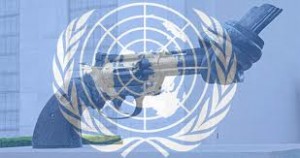Senior Editor
The Second Amendment Foundation and several other pro-rights groups weighed in recently on a new round of discussions at the United Nations that could lead to another proposed Arms Trade Treaty document.
Representing SAF was Julianne Versnel, director of operations and a veteran of the global gun control fight. But her remarks, and those of other pro-gun-rights speakers, were not heard because the UN shut down due to Hurricane Sandy.
However, the remarks were delivered, and copies of those statements have been obtained by TGM.
Joining Versnel were D. Allen Youngman, executive director of the Defense Small Arms Advisory Council and Ted Rowe, chairman of the Manufacturers Advisory Group to the World Forum on Shooting Activities.
In her statement, Versnel stressed the right of self-defense as a human right that is particularly important to women in nations where they have been used and abused; where rape is used as a weapon and where the “authorities” have done nothing.
“We have a right to protect our bodies, to protect ourselves against assault and rape,” she said. “No one questions that violence against women is endemic. Mr. Chairman there are those who say women should rely on the police, the authorities, or even the UN for protection. Mr. Chairman, I reject this idea. In fact Mr. Chairman, this concept is part of the outmoded and disproved idea that women are somehow weaker and must rely on men for their protection.”
She acknowledged that most of the delegates realize that in the United States, there is extensive firearms ownership by private citizens.
“What they do not know,” she said, “is that almost half of the handguns in the US are owned by women. They are used for self-defense by women. I fully endorse, as should every person in this room, the idea that women must have the means to defend themselves. Nothing that is before this this Committee, in an ATT or part of the POA should affect a women’s right to defend herself.”
She reminded the delegates in her comments about former First Lady Eleanor Roosevelt, who traveled through the South in 1958 to promote equality. She carried a .38-caliber revolver on those trips for protection against the Ku Klux Klan and others who were opposed to her activities.
Mrs. Roosevelt was the first United States ambassador to the UN, and “also was essentially the mother of the UN’s Declaration of Human rights,” Versnel stated.
Youngman’s statement to the delegates presented a perspective of the firearms and light weapons industry in their efforts “to meet their legitimate national security and law enforcement requirements.”
“We believe,” Youngman said, “that a legally binding Arms Trade Treaty that subjects all military arms manufacturers and exporters world-wide to a similar level of regulation can be of benefit in combating the armed violence caused by the absence of common standards governing the international trade in military weapons.”
“It is difficult to ignore the fact that the vast majority of states currently lack even the most rudimentary export licensing systems,” he continued, “much less comprehensive ones with correspondingly effective enforcement mechanisms. The ATT was, we thought, to begin addressing that lack.”
“From our perspective as observers of the negotiations conference in July,” he explained, “it appears that the chief obstacle to achieving consensus on an effective treaty text was the insistence by some on creating an overly broad document, one that went well beyond the committee’s mandate, irrespective of the fact that such language was unlikely to ever be agreed and, even if agreed, effectively carried into force.
“A treaty can be likened to a vessel,” Youngman stated. “It can carry only so much freight and attempting to overload it with too many things that, although desirable to some are objectionable to others, poses the risk of sinking it. In July, the vessel was overloaded and nearly sank; fortunately, it was still tied to the pier and may yet set sail, once the excess weight is removed.”
In his statement, Rowe, who worked for many years in the US firearms industry, was blunt.
“Speaking on behalf of the world’s leading manufacturers of civilian firearms and ammunition,” he stated, “we must insist on the recognition of civilian possession and ownership of firearms and ammunition in accordance with national law.
“Unless and until the United Nations in its various proposals recognizes the right of lawful civilian ownership and possession of firearms,” Rowe added, “we will continue to use all efforts necessary to have civilian ownership recognized by the United Nations, and we will continue to oppose those proposals that do not recognize this right.”
Rowe insisted that “The Arms Trade Treaty to be negotiated in March of 2013 should clearly indicate that the small arms included are for military use and that civilian firearms are to be excluded.”
“Civilian use of firearms is seen internationally in Olympic Games, in hunting around the world, in sport shooting and in recreational use,” he noted. “There is the human right of self-protection and self-defense and the need and use of firearms to fulfill that right. This right is indisputable and is documented throughout history.”




